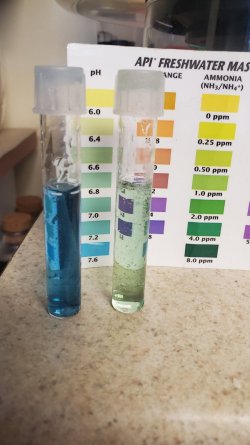outofwater
Fish Addict
So, 2 weeks ago I tried to get 3 ottos to keep company to the lonely one I keep (had 2, but one died about a month in and this one has been lonely ever since).
All 3 died in days in the quarantine tank. I went back to the shop with water and pH test showed off the chart blue (api kit, same one I have at home). The guy put too much reacting agent, the water was nearly black at the shop. But when I came home I ran 3 tests back to back on my 3 tanks and tap water, and tested with strips too, for good measure.
To my dismay, the tap water is consistently above the grading scale. The guy at the shop told me to "let it rest" a few days, it seems to slightly lower it, but it still is above the darkest shade.
I use a brita filter and that water tests at around 6.6, right after the brita is done filtrating it.
When I started my tanks, back in December last year, the pH off the tap was 7 to 7.5, and once in the tanks it stayed or even went down a bit on the most heavily planted one.
Now the 10g where I keep my lonely dwarf gourami is reading 7.6, the quarantine tank maybe 7.2, and the 29g, the one with the most plants, at 7.
I don't want to add chemicals, and besides driftwood and more plants, both of which I do plan on getting, what would you recommend? I'm thinking of adding a small filtration system to my kitchen sink, however the ones I've looked at seem to take ages to filtrate any decent amount, and given that all in all I change anywhere from 5 to 10 gallons weekly (10 to 15% per tank) it doesn't seem that practical, but I know I have to do something about this.
Posted picture is tap water. Left side: sitting on a bucket for 3+ days, right side, right off the tap, after being filtered in the brita.
Thank you in advance.
All 3 died in days in the quarantine tank. I went back to the shop with water and pH test showed off the chart blue (api kit, same one I have at home). The guy put too much reacting agent, the water was nearly black at the shop. But when I came home I ran 3 tests back to back on my 3 tanks and tap water, and tested with strips too, for good measure.
To my dismay, the tap water is consistently above the grading scale. The guy at the shop told me to "let it rest" a few days, it seems to slightly lower it, but it still is above the darkest shade.
I use a brita filter and that water tests at around 6.6, right after the brita is done filtrating it.
When I started my tanks, back in December last year, the pH off the tap was 7 to 7.5, and once in the tanks it stayed or even went down a bit on the most heavily planted one.
Now the 10g where I keep my lonely dwarf gourami is reading 7.6, the quarantine tank maybe 7.2, and the 29g, the one with the most plants, at 7.
I don't want to add chemicals, and besides driftwood and more plants, both of which I do plan on getting, what would you recommend? I'm thinking of adding a small filtration system to my kitchen sink, however the ones I've looked at seem to take ages to filtrate any decent amount, and given that all in all I change anywhere from 5 to 10 gallons weekly (10 to 15% per tank) it doesn't seem that practical, but I know I have to do something about this.
Posted picture is tap water. Left side: sitting on a bucket for 3+ days, right side, right off the tap, after being filtered in the brita.
Thank you in advance.




